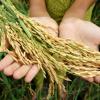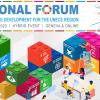News
Displaying Results 151 - 175 of 434
On the occasion of the 7th UN Global Road Safety Week, UNECE together with UNICEF Uzbekistan and the Ministry of Interior of Uzbekistan organized a workshop to discuss how to improve the national road safety system in the country.
The workshop kicked off with a policy dialogue with national road…
20 May marks the World Metrology Day, celebrating the international system of units, which coincides with the anniversary of the signing of the Metre Convention in 1875. This treaty created the International Bureau of Weights and Measures (BIPM) which coordinate international metrology and the…
In 2021, Chile was the world’s fourth largest importer of second-hand and unsold clothes, and the first in Latin America. Imports reached some 126,000 million tons, originating principally from China, the United States and the Republic of Korea.
About 40% of these clothes are imported through…
Research on and monitoring of the effects of air pollution on different environmental media and health has been carried out for more than four decades under the UNECE Convention on Long-range Transboundary Air Pollution. The data and research that has emerged from these efforts is unique as it…
How can regional and international cooperation be fostered in a region that faces unprecedented water scarcity? How can the benefits of this vital resource be shared to increase resilience to climate change?
The Third Baghdad International Water Conference titled "Water Scarcity, the Mesopotamian…
Originally published as a guest article by IISD’s SDG Knowledge Hub.
How can we rescue the vision of the 2030 Agenda for Sustainable Development and get in shape for Our Common Agenda for 2050? Part of the way forward is without doubt to embrace the digital and green transitions.
As we heard…
Young professionals from industry, academia, and civil society came together to discuss and explore solutions for sustainable resource management at the UNECE Resource Management Week 2023. Hosted by the UNECE Resource Management Young Member Group (RMYMG), the highly interactive session provided a…
Uzbekistan is one of the world's largest producers of gold and uranium. In the last 40 years, Uzbekistan has built a strong mining industry, which is expected to grow in the years to come, given that only 20 % of the country’s territory has yet been explored. The expected rise in the number and…
In a move towards sustainable resource management, several countries have presented case studies of how the United Nations Framework Classification for Resources (UNFC) can scale-up harmonized resource management. UNFC provides a common language and standards for the classification of all energy…
Countries are increasingly facing multiple interlinked environmental, social, economic and health challenges – climate change, pollution from chemicals and wastes, biodiversity loss and species extinction, deforestation, land degradation, emerging zoonotic diseases, and the impact of armed…
The massive use of fertilizers and the production and use of manure in agriculture over the past 100 years have led to significant reactive nitrogen emissions to air and releases to water and land. Burning of fossil fuels (in vehicles, power plants and industry) is another source of reactive…
Prevention of and preparedness for industrial accidents require special attention in Tajikistan, a country with a strong mining industry. The mountainous terrain of mining sites makes them highly susceptible to earthquakes, mudflows and floods, which can provoke Natech events (natural hazards…
Faced with shortages of petrol and diesel since the start of the war in February 2022, and with the rising impacts of the ongoing energy crisis, Ukraine aims at strengthening energy security through the development of renewable energy, notably biofuels and biomass.
Key challenges and…
Young people are emerging as crucial champions for the achievement of the sustainable development agenda of countries in the UNECE region. The ideas and perspectives of new generations, who are acutely aware of the environmental challenges that the world faces, can help shape the policies and…
While many of us have taken pain relievers, we do not always remember that one of the most extensively used medicines in the world – with an estimated annual consumption of 40,000 tons – salicylic acid, commonly known as aspirin, is based on a tree-derived ingredient.
The theme of this year’s…
A recent study published in The Lancet found that almost the whole world's population was exposed to unsafe levels of air pollution in 2019, with only a mere 0.001 percent breathing air that contains fine particulate matter (PM2.5) at concentrations lower than what the World Health Organization…
What are emission inventories and what purpose do they serve? Why is it important to develop emission inventories? If you don’t know the answer to these questions, you might be interested in taking the e-learning course on How to report emissions under the Convention on Long-range Transboundary Air…
Industrial safety and the prevention of accidental water pollution were high on Kazakhstan’s agenda this week, with the Second Meeting of the Inter-institutional Working Group on Tailings Safety and the Prevention of Accidental Water Pollution (IIWG).
The meeting brought together more than 60…
Innovation and Technology, which is the focus of this year’s International Women’s Day, presents powerful opportunities for gender equality, and offers welcome hope at a time of great challenges for women’s empowerment. In fact, the regional progress report on the Sustainable Development Goals (…
What value do official statistics offer? The work of National Statistical Offices (NSOs), which produce the headline figures on the economy, population and environment that we see in the news every day, is driven by a conviction that such work is uniquely valuable, playing an essential role in…
This year’s Regional Forum on Sustainable Development (Geneva, 29-30 March 2023) is taking place against the background of multiple crises: the lingering aftermath of the COVID-19 pandemic; the war in Ukraine; food, energy and cost-of-living crises; economic downturn; and financial vulnerabilities…
While companies and stakeholders across industries will not tire to make promises that include their willingness to become more transparent, we still see little actual progress. Research by Deloitte has shown that 65% of procurement leaders across sectors have limited or no visibility beyond their…
Inland transport plays a crucial role in the global economy, connecting people, goods and services to markets and opportunities. However, the rapid growth in this sector has had a significant impact on the environment. The increasing demand for faster and more efficient modes of transport has led…
While the impacts of air pollution on vegetation and crops are sometimes overlooked, they can take a high toll on food production. As the food and energy crises have recently shown the vulnerability of our food systems, the impacts of air pollution on agricultural yields and food production should…
The 61st Commission for Social Development concluded yesterday with the adoption of a resolution calling for acceleration of the implementation of the Madrid International Plan of Action on Ageing (MIPAA). The Commission session concluded the fourth global review and appraisal of MIPAA, which…























